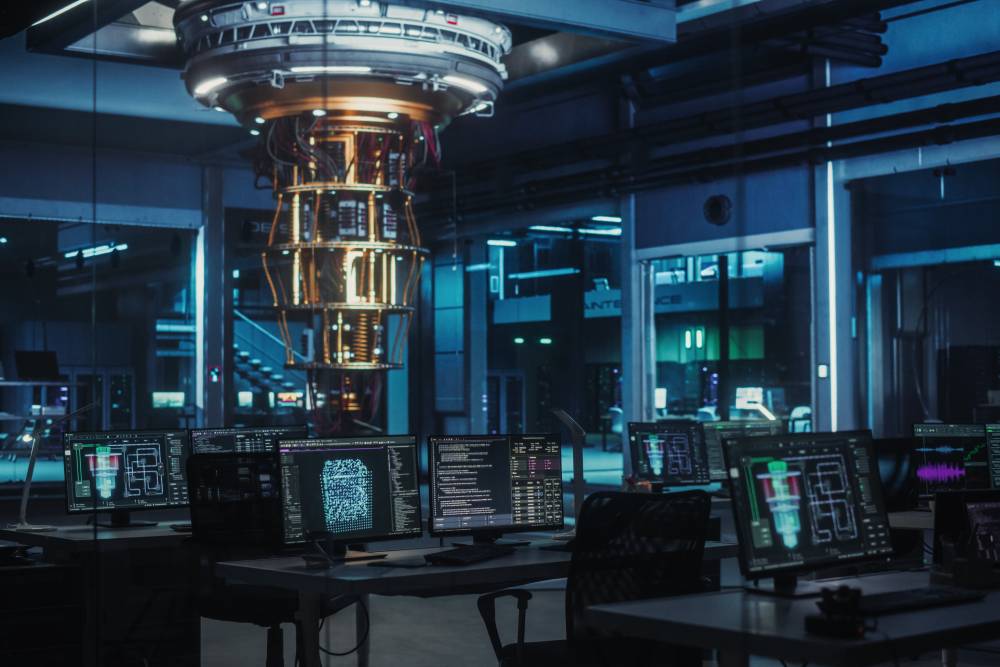As 2025 marks the international year of quantum science and technology, UNIDIR organized a webinar series that built on the momentum of its 2024 Innovations Dialogue on quantum technologies. The series focused on a less-explored yet increasingly critical frontier – the intersection of quantum technologies and artificial intelligence (AI), and the implications this convergence holds for international peace and security.
In his report on Current developments in science and technology and their potential impact on international security and disarmament efforts, the UN Secretary-General underscores that the integration of quantum technologies and AI presents both opportunities and challenges for international peace and security. The symbiotic relationship of these two transformative fields has sparked considerable anticipation for their convergence potential, particularly within the scientific and technical communities. AI’s role is increasingly evident in quantum research and development, accelerating advancements in the field. In turn, quantum progress is poised to exponentially enhance AI capabilities, while also reducing costs, improving scalability, and strengthening data security. However, this synergy also introduces new complexities and challenges that must be addressed.
From an international security perspective, the quantum-AI nexus raises important questions for policymakers and diplomats. The potential use of quantum technologies in defense and security contexts can raise ethical concerns similar to those associated with AI – such as issues of explainability, accountability, and unintended consequences – and could therefore heighten these risks when integrated into military AI systems. In addition, quantum combined with AI could lead to improved speed of modelling and simulations, which may have a direct impact on the speed of military decision-making and operations. As relevant military applications and new capabilities are still emerging, adopting a future-focused approach could help the international community proactively identify and tackle potential risks.
The two-part webinar series brought together experts from scientific, technical, military and policy communities to explore the emerging quantum-AI nexus, examine the evolving technology landscape and consider the implications for international peace and security, including the novel challenges this convergence may present.
Event recording
When and where
Tuesday, 4 November and Tuesday, 18 November, 3:00-4:00 PM (CET), online via Webex.
Webinar series schedule
Part 1: Decoding the Quantum-AI Nexus
Tuesday, 4 November 2025, 3:00 – 4:00 PM CET
The first webinar provided an overview of the growing convergence between quantum and AI technologies, offering insights into the current landscape and anticipated near-term developments. It highlighted the symbiotic relationship between the two fields – namely, how AI tools help enhance quantum research and development, as well as how emerging quantum technologies could, in turn, transform AI and machine learning. The session featured two presentations delivered by experts from the scientific and technical communities:
- Presentation 1: AI-integrated Quantum Sensing Applications, presented by Dr Stefan Leichenauer, Vice President of Engineering, SandboxAQ
- Presentation 2: Quantum-enhanced AI and Machine Learning, presented by Dr Caitlin Jones, Senior Researcher, Quantum Software Lab, University of Edinburgh
Part 2: Exploring the Quantum-AI Nexus in Defense and Security
Tuesday, 18 November 2025, 3:00 – 4:00 PM CET
The second webinar examined the implications of the quantum-AI nexus in defense and security contexts. As relevant military applications are still in their early stages of conceptualization and development, the discussion focused on assessing the potential impact of leveraging the quantum-AI nexus on future battlefields, military operations, strategic stability and arms control. The session featured an interactive discussion with experts working on emerging defense and security technologies:
- Dr Michal Krelina, Research Scientist, Czech Technical University; Associate Senior Researcher, Armament and Disarmament, Stockholm International Peace Research Institute
- Taniel Yusef, Technology Developers Coordinator, UK Campaign to Stop Killer Robots; Research Affiliate, Centre for the Study on Existential Risk, University of Cambridge
- Dr Elie Alhajjar, Senior Information Scientist, RAND, and Professor of Policy Analysis, Pardee RAND Graduate School
Both sessions were moderated by Wenting He, Associate Researcher, Security and Technology Programme, UNIDIR.
Further information
Please contact sectec-unidir@un.org if you have any questions.
